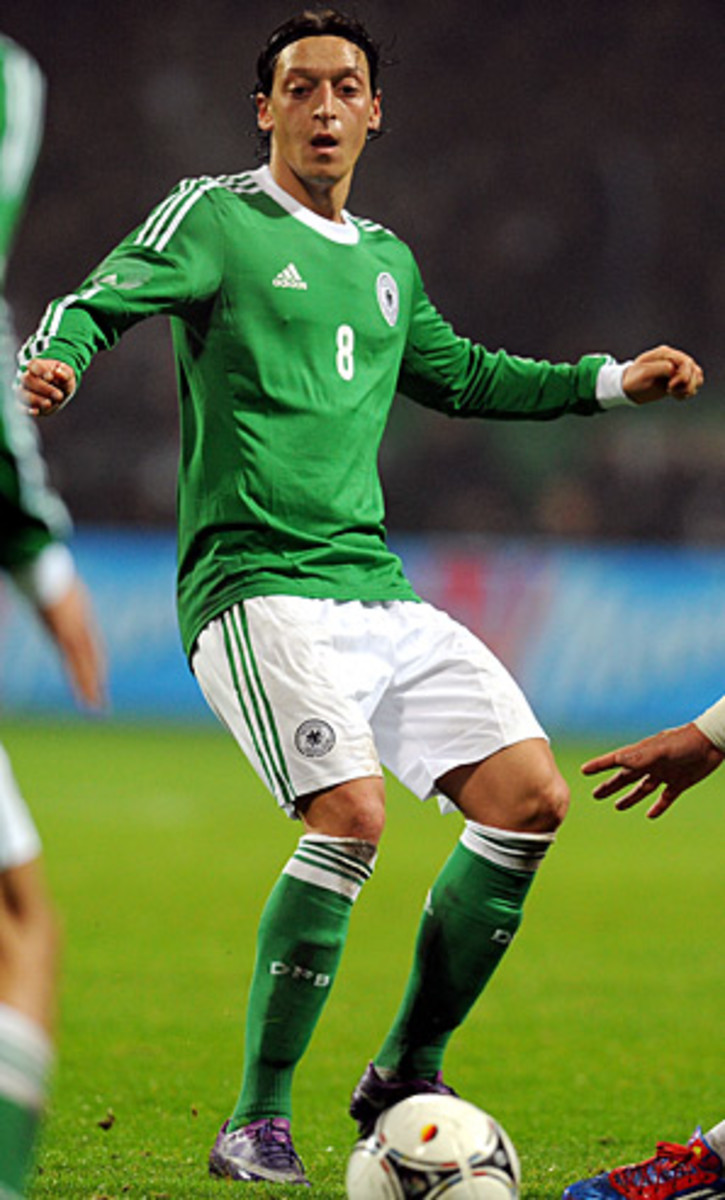Germany's defense gives Löw cause for concern ahead of Euros
The match was, in other words, a very sobering experience. And that's precisely the reason it was such a "wonderful" -- or, at least, good -- defeat, one that came "at the right time," according to Löw's assistant Hansi Flick. Going down to a decent but by no means sensational French team will dampen unrealistic expectations outside the changing room, deter the onset of complacency inside it, and provide "practice makes perfect" -- afficionado Löw with a wealth of material for countless hours of video analysis for the next couple of months. His Germany, he said, were able to play at "an insane level going forward" as evidenced by the late Cacau consolation goal but needed to tighten up significantly at the back. It shouldn't be a insurmountable problem. Most international sides are pretty good at parking the bus but can't even begin to hope to be as strong in the final third.
Here's a look at how the match has affected the different sections of the team and Löw's thinking on the whole.
Wednesday night saw Tim Wiese play his sixth game for the national team. The Werder Bremen goalie wasn't at fault for any of the goals but provided consistency of the wrong sort: Germany has yet to win a game in which he features. "The Wiese curse," Bild called, unkindly. The 30-year-old was given the nod ahead of younger, and more cultured rivals for the second spot (Bernd Leno, Ron-Robert Zieler, Marc-Andre ter Stegen), his involvement at the Euros is not a foregone conclusion, however. Some experts felt that Wiese's start in front of his home crowd amounted to some kind of unofficial testimonial. Löw, as the Ballack affair proved, doesn't like conflict and prefers to phase out players gently. His omission from the finals squad would not be the biggest surprise. But Bayern Munich's Manuel Neuer is so secure in his position that all debates about number twos and threes are somewhat academic at this stage.
What defense?, one might feasibly ask, even if the individual performances were made to look much worse by the collective failure to minimize space in Germany's own half. Löw has lost his most experienced center back, the injured Per Mertesacker (Arsenal), and is yet to find suitable replacements. Mats Hummels (Dortmund) is still struggling to take his club form to the international stage and is somewhat hampered by an over-eagerness to come out to intercept balls in midfield. Bayern's Holger Badstuber, a solid but hardly spectacular player, was also found dragged out of his position for the first France goal. Jérôme Boateng, also of Bayern, is of a similar standard but will probably have to fill in at right fullback, Germany's softest spot since the captain Phillip Lahm switched back to the left side last year. Boateng can hold his own but never looks particularly happy on the right, and the same is true, to a lesser extent, of Schalke's Benedikt Höwedes, another center back who gets moved sideways. On the left, there's only Lahm really. His principal back-up, Dennis Aogo of Hamburger SV, was widely rated Germany's weakest performer on the night and should not get anywhere near the Euro squad on this evidence. Marcel Schmelzer, of champions Dortmund, looks like the obvious man for the job but Löw still harbours doubt about his skill set and lack of experience at international level.
Without Bastian Schweinsteiger, who missed the match due to an ankle injury, Germany appeared a bit like a split team; there was no natural link between those thinking about going forward and those primarily tasked to protect their own half. But that's merely a question of fine-honing tactics. Löw has almost too many excellent players at his disposal here. The elegant Toni Kroos (Bayern) is rapidly growing into a genuine rival to the more defensively-minded Sami Khedira (Real Madrid) for the second "anchor" spot next to the imperious Schweinsteiger. The two Bender twins, Lars (Leverkusen) and Sven (Dortmund) are not far behind and may yet pip a more seasoned campaigner to a starting berth come June. A littler further ahead, Madrid's Mesut Özil keeps growing as a player but can't afford to let up in light of Kroos' preference for the number 10 role. On the right, Thomas Müller will have to keep Marco Reus (Gladbach) at bay, while Köln's Lukas Podolski must fight off competition from Mario Götze (Dortmund) and Andre Schürrle (Leverkusen). The German midfield has everything in abundance: skill, guile, depth, creativity.
Veteran striker Klose, aged 33, is still ahead of the more prolific Mario Gomez (Bayern Munich), who moves less well, links up less well and goes through inexplicable mood-swings with ensuing loss of confidence. Two attackers for one spot are one too many but perhaps not quite enough should injuries or suspensions take their toll. In Bremen, Löw raised eye-brows by persisting with the more versatile Cacau as the third man. The naturalised Brazilian has been poor for Stuttgart in recent weeks, however, and might still be left behind as Podolski's good form for Köln (15 goals), where he plays as a central forward, provides the coach with another genuine option upfront.
Löw has experimented with different formations (4-1-4-1 and 4-3-3) in the qualifiers but tough opposition in the group stages makes it likely that he will stick to his favoured 4-2-3-1; a system that provides maximum flexibility as well as protection for the vulnerable back four. After spending so much time in practicing attacking moves in the last couple of years, the focus will now shift towards pressing the opposition and squeezing space in midfield, perhaps in conjunction with a slightly higher defensive line. It'll be fascinating to see whether the tactical evolution from the gung-ho approach of Klinsmann to a sort of Teutonic version of Spain can reach the next level over the course of the summer.





